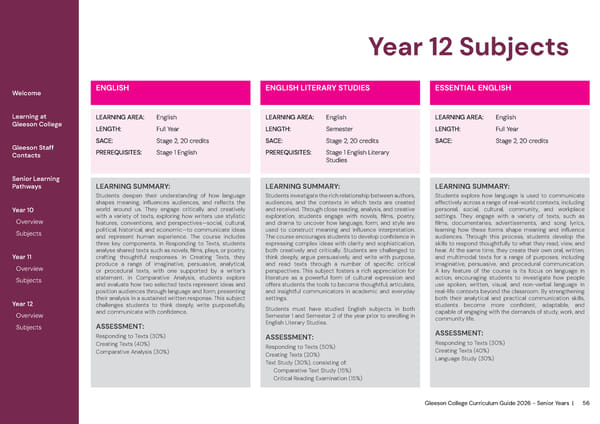Gleeson College Curriculum Guide 2026 - Senior Years | 56 Year 12 Subjects Welcome Learning at Gleeson College Gleeson Staff Contacts Senior Learning Pathways Year 10 Overview Subjects Year 11 Overview Subjects Year 12 Overview Subjects LEARNING SUMMARY: Students deepen their understanding of how language shapes meaning, influences audiences, and reflects the world around us. They engage critically and creatively with a variety of texts, exploring how writers use stylistic features, conventions, and perspectives—social, cultural, political, historical, and economic—to communicate ideas and represent human experience. The course includes three key components. In Responding to Texts, students analyse shared texts such as novels, films, plays, or poetry, crafting thoughtful responses. In Creating Texts, they produce a range of imaginative, persuasive, analytical, or procedural texts, with one supported by a writer’s statement. In Comparative Analysis, students explore and evaluate how two selected texts represent ideas and position audiences through language and form, presenting their analysis in a sustained written response. This subject challenges students to think deeply, write purposefully, and communicate with confidence. ASSESSMENT: Responding to Texts (30%) Creating Texts (40%) Comparative Analysis (30%) ENGLISH LEARNING AREA: English LENGTH: Full Year SACE: Stage 2, 20 credits PREREQUISITES: Stage 1 English ENGLISH LITERARY STUDIES LEARNING AREA: English LENGTH: Semester SACE: Stage 2, 20 credits PREREQUISITES: Stage 1 English Literary Studies LEARNING SUMMARY: Students investigate the rich relationship between authors, audiences, and the contexts in which texts are created and received. Through close reading, analysis, and creative exploration, students engage with novels, films, poetry, and drama to uncover how language, form, and style are used to construct meaning and influence interpretation. The course encourages students to develop confidence in expressing complex ideas with clarity and sophistication, both creatively and critically. Students are challenged to think deeply, argue persuasively, and write with purpose, and read texts through a number of specific critical perspectives. This subject fosters a rich appreciation for literature as a powerful form of cultural expression and offers students the tools to become thoughtful, articulate, and insightful communicators in academic and everyday settings. Students must have studied English subjects in both Semester 1 and Semester 2 of the year prior to enrolling in English Literary Studies. ASSESSMENT: Responding to Texts (50%) Creating Texts (20%) Text Study (30%), consisting of: Comparative Text Study (15%) Critical Reading Examination (15%) ESSENTIAL ENGLISH LEARNING AREA: English LENGTH: Full Year SACE: Stage 2, 20 credits LEARNING SUMMARY: Students explore how language is used to communicate effectively across a range of real-world contexts, including personal, social, cultural, community, and workplace settings. They engage with a variety of texts, such as films, documentaries, advertisements, and song lyrics, learning how these forms shape meaning and influence audiences. Through this process, students develop the skills to respond thoughtfully to what they read, view, and hear. At the same time, they create their own oral, written, and multimodal texts for a range of purposes, including imaginative, persuasive, and procedural communication. A key feature of the course is its focus on language in action, encouraging students to investigate how people use spoken, written, visual, and non-verbal language in real-life contexts beyond the classroom. By strengthening both their analytical and practical communication skills, students become more confident, adaptable, and capable of engaging with the demands of study, work, and community life. ASSESSMENT: Responding to Texts (30%) Creating Texts (40%) Language Study (30%)
 2026 Gleeson College Senior Years Curriculum Guide 2026 Page 55 Page 57
2026 Gleeson College Senior Years Curriculum Guide 2026 Page 55 Page 57